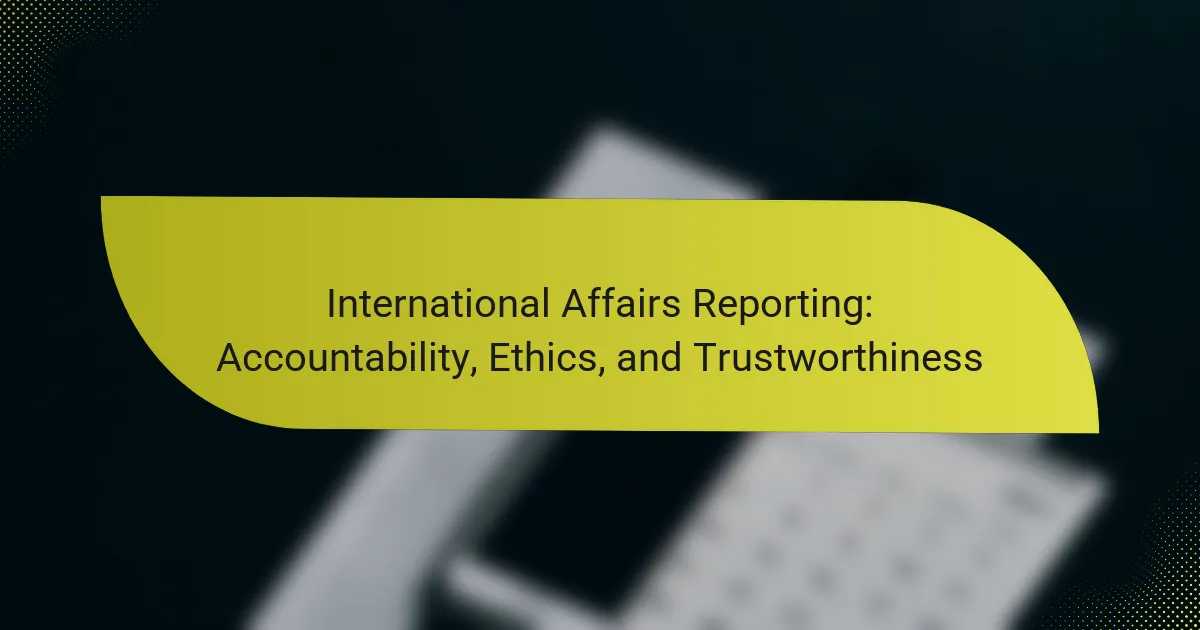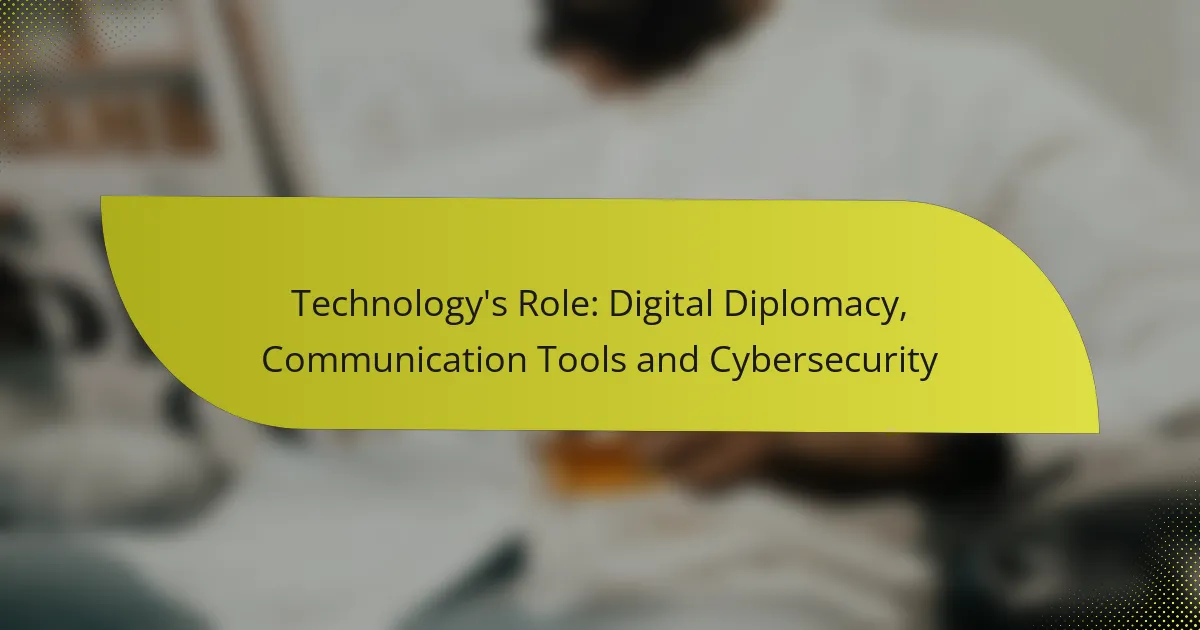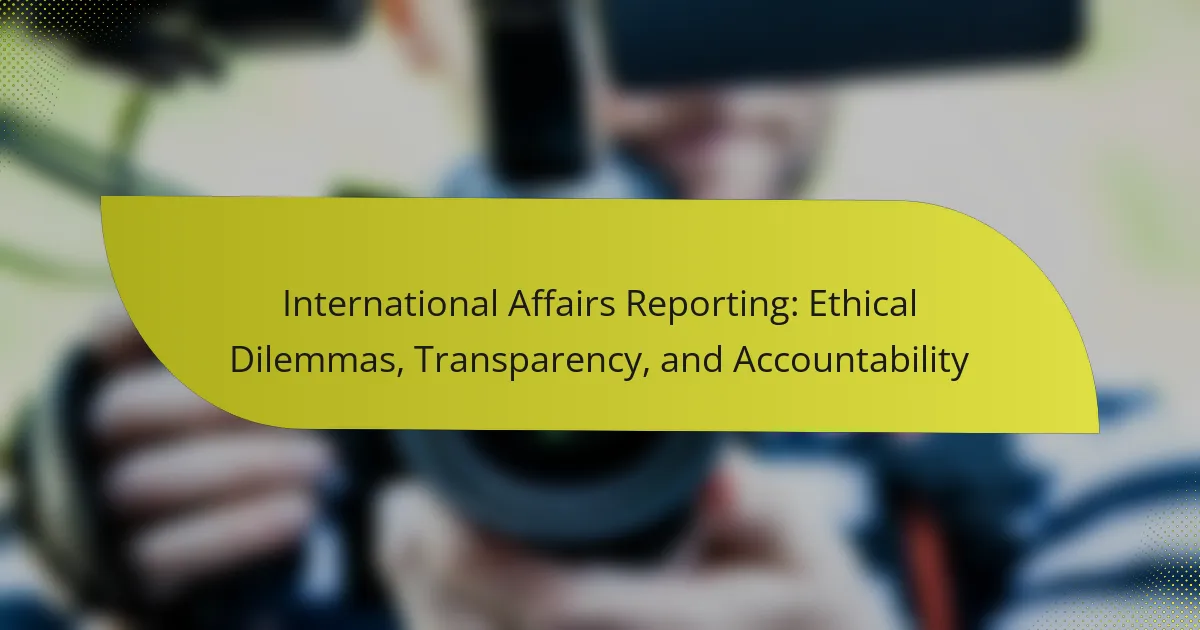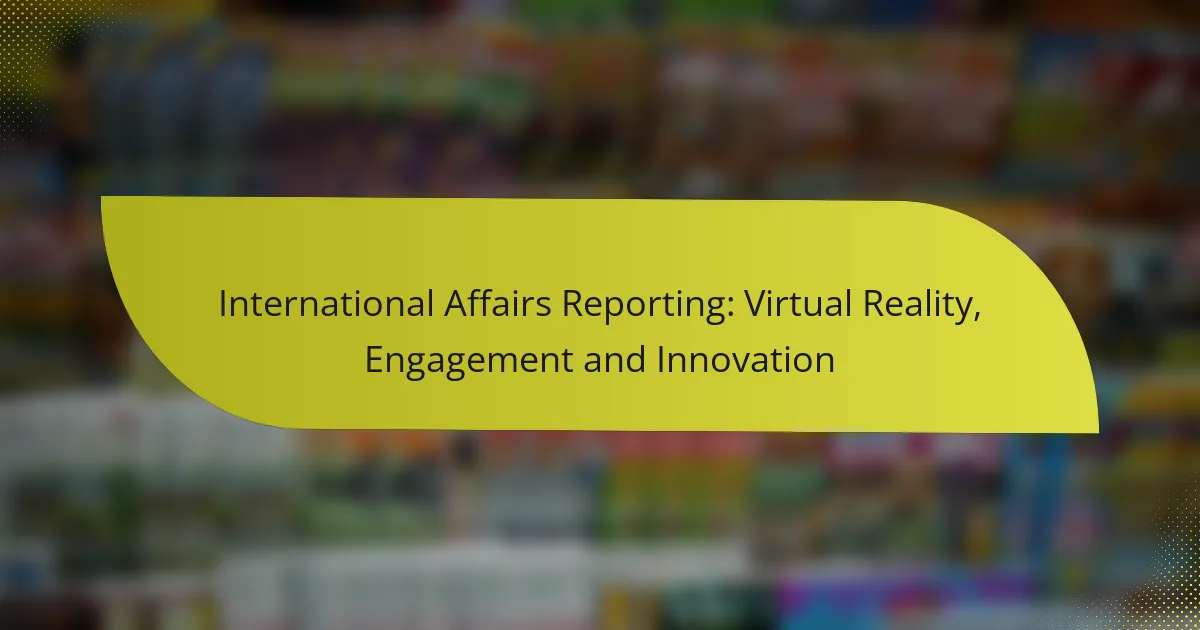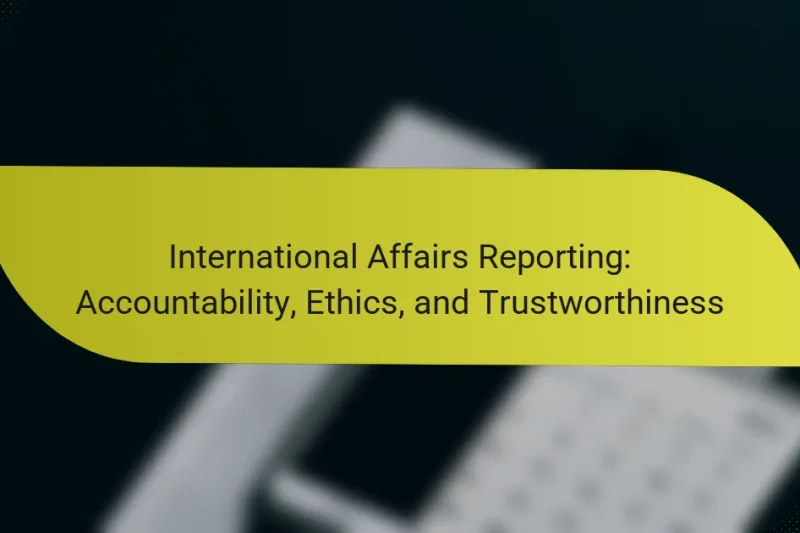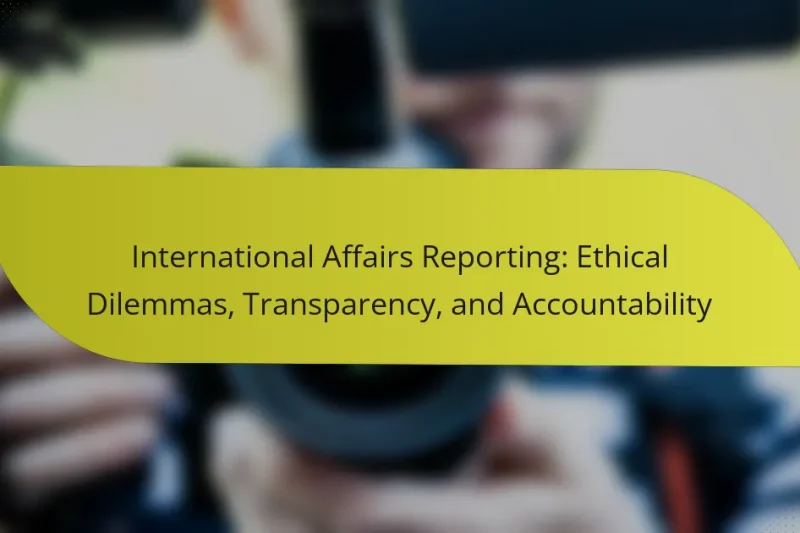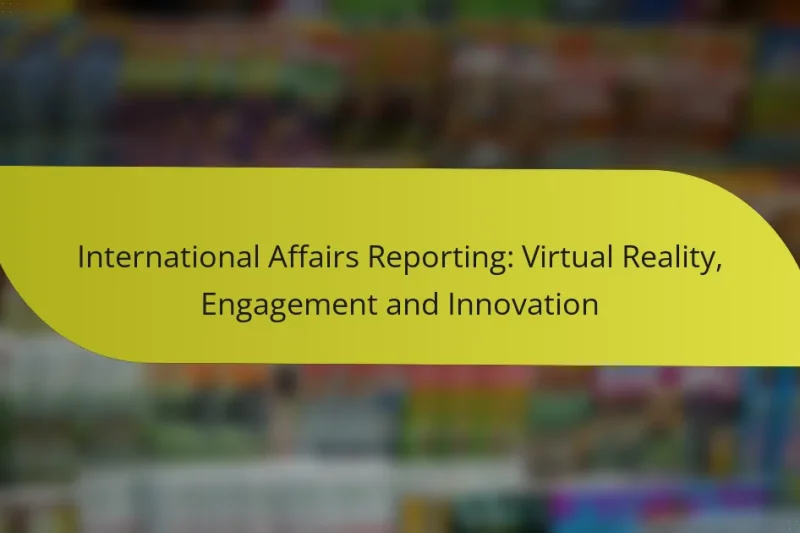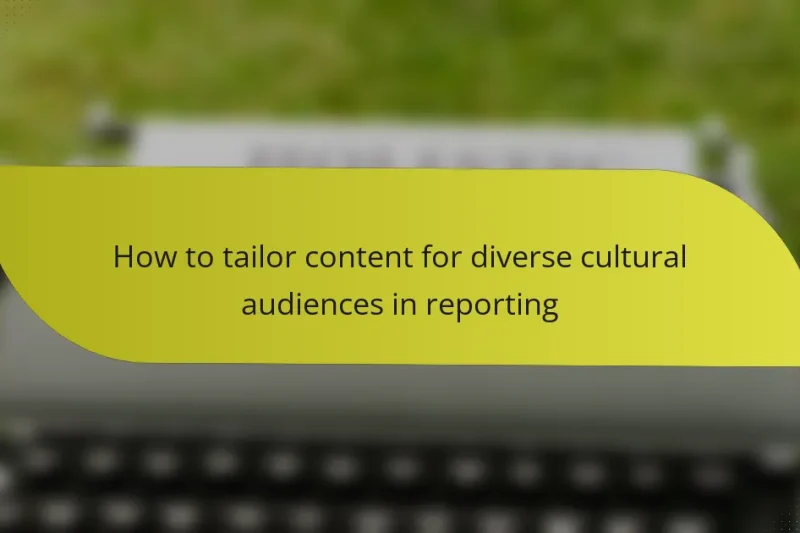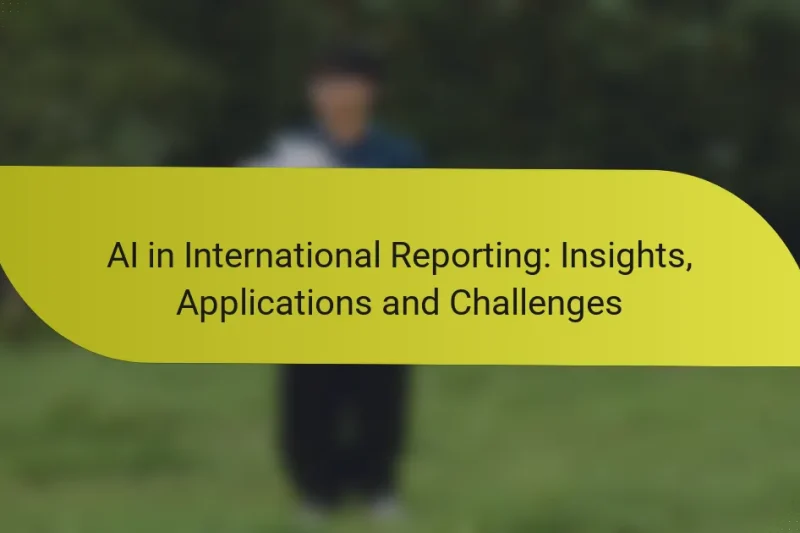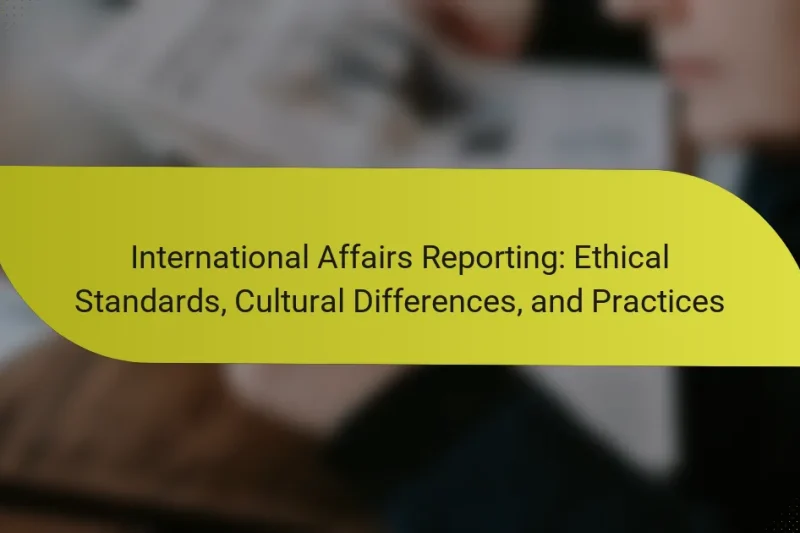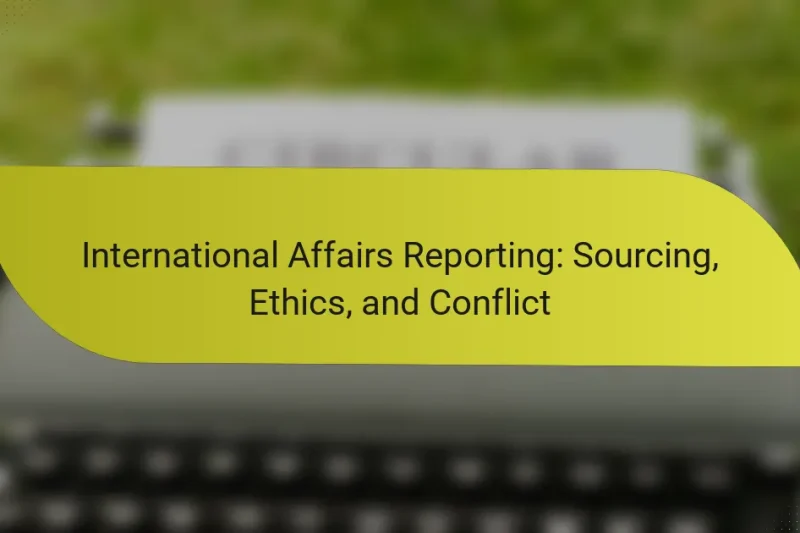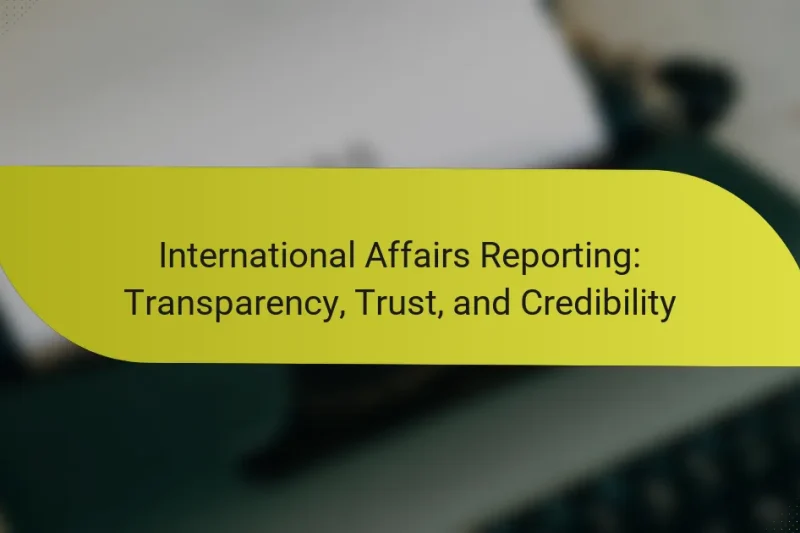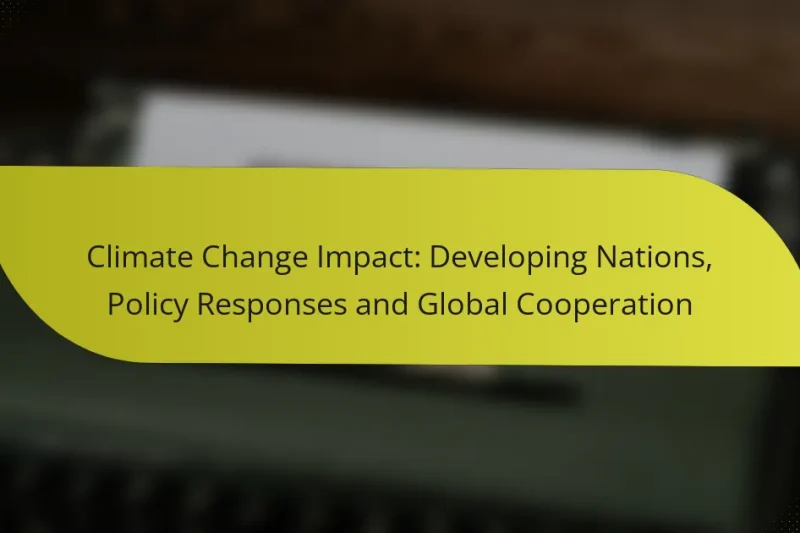International affairs reporting plays a vital role in promoting accountability and trustworthiness through adherence to rigorous … International Affairs Reporting: Accountability, Ethics, and TrustworthinessRead more
International affairs reporting plays a crucial role in shaping global politics by providing essential insights and narratives that influence public perception and policy decisions. However, journalists in this field face significant challenges, including access to reliable information and the threat of bias and misinformation. Leading organizations like BBC News, Al Jazeera, and The New York Times are at the forefront, delivering in-depth analysis and diverse perspectives on pressing global issues.
Technology’s Role: Digital Diplomacy, Communication Tools and Cybersecurity
In today’s interconnected world, technology plays a pivotal role in shaping digital diplomacy by enabling swift … Technology’s Role: Digital Diplomacy, Communication Tools and CybersecurityRead more
International Affairs Reporting: Ethical Dilemmas, Transparency, and Accountability
International affairs reporting is fraught with ethical dilemmas that challenge journalistic integrity and public trust, including … International Affairs Reporting: Ethical Dilemmas, Transparency, and AccountabilityRead more
International Affairs Reporting: Virtual Reality, Engagement and Innovation
Virtual reality (VR) is revolutionizing international affairs reporting by offering immersive experiences that deepen audience engagement … International Affairs Reporting: Virtual Reality, Engagement and InnovationRead more
How to tailor content for diverse cultural audiences in reporting
Tailoring content for diverse cultural audiences in reporting is essential for effective communication and engagement. By … How to tailor content for diverse cultural audiences in reportingRead more
AI in International Reporting: Insights, Applications and Challenges
AI is transforming international reporting by streamlining data analysis, accelerating news production, and enhancing audience interaction. … AI in International Reporting: Insights, Applications and ChallengesRead more
International Affairs Reporting: Ethical Standards, Cultural Differences, and Practices
International affairs reporting demands a commitment to ethical standards that prioritize accuracy, fairness, and responsibility in … International Affairs Reporting: Ethical Standards, Cultural Differences, and PracticesRead more
International Affairs Reporting: Sourcing, Ethics, and Conflict
International affairs reporting requires a commitment to sourcing reliable information from credible entities such as government … International Affairs Reporting: Sourcing, Ethics, and ConflictRead more
International Affairs Reporting: Transparency, Trust, and Credibility
International affairs reporting plays a crucial role in promoting transparency by delivering clear and accessible information … International Affairs Reporting: Transparency, Trust, and CredibilityRead more
Climate Change Impact: Developing Nations, Policy Responses and Global Cooperation
Climate change poses a significant threat to developing nations, amplifying environmental hazards, jeopardizing food security, and … Climate Change Impact: Developing Nations, Policy Responses and Global CooperationRead more
How does international affairs reporting impact global politics?
International affairs reporting significantly influences global politics by shaping narratives and informing decision-makers. It provides critical insights that can alter public perception and policy directions, ultimately affecting diplomatic relations and international stability.
Influence on policy decisions
International affairs reporting can directly impact policy decisions by highlighting pressing global issues. For example, extensive coverage of humanitarian crises may prompt governments to allocate resources or change their foreign policy stance. Policymakers often rely on media reports to gauge public sentiment and adjust their strategies accordingly.
Moreover, investigative journalism can uncover corruption or mismanagement, leading to policy reforms. Reports that reveal the consequences of certain actions can create pressure for change, influencing legislative agendas and international agreements.
Shaping public opinion
Media coverage of international events plays a crucial role in shaping public opinion. By framing issues in specific ways, reporting can create narratives that resonate with audiences, influencing their views on foreign policy and international relations. For instance, the portrayal of conflicts may sway public support for military interventions or humanitarian aid.
Social media has amplified this effect, allowing news to spread rapidly and reach diverse audiences. As a result, public opinion can shift quickly based on how international affairs are reported, prompting governments to respond to constituents' concerns.
Role in diplomatic relations
International affairs reporting is vital in maintaining and shaping diplomatic relations between countries. Accurate and balanced reporting fosters trust and transparency, while biased or sensationalized coverage can strain relationships. Diplomats often monitor media narratives to understand how their actions are perceived globally.
Furthermore, media outlets can serve as platforms for dialogue, allowing countries to communicate their positions and respond to criticisms. This interaction can either enhance diplomatic efforts or exacerbate tensions, depending on the nature of the reporting.
What are the key challenges in international affairs reporting?
International affairs reporting faces several significant challenges, including access to reliable sources, bias and misinformation, and security concerns for journalists. These factors can hinder the accuracy and integrity of news coverage on global issues.
Access to reliable sources
Accessing reliable sources is crucial for accurate international affairs reporting. Journalists often rely on government officials, NGOs, and local experts, but these sources may not always be available or willing to share information. Building a network of trustworthy contacts can help reporters gather diverse perspectives.
Additionally, language barriers and cultural differences can complicate communication. Reporters should consider using local translators or collaborating with regional journalists to ensure they capture the nuances of the situation accurately.
Bias and misinformation
Bias and misinformation are pervasive challenges in international reporting. Journalists must navigate various narratives and agendas that can distort the truth. It is essential to cross-check information against multiple sources to mitigate the risk of spreading falsehoods.
To combat bias, reporters should strive for balanced coverage that represents different viewpoints. Utilizing fact-checking organizations can also enhance credibility and help clarify complex issues for the audience.
Security concerns for journalists
Security concerns pose significant risks for journalists covering international affairs, especially in conflict zones. Reporters may face threats from hostile governments, armed groups, or even local populations. Understanding the security landscape and having contingency plans is vital for their safety.
Journalists should prioritize their safety by adhering to best practices, such as traveling in pairs, avoiding high-risk areas, and using secure communication methods. Training in conflict reporting and risk assessment can further prepare journalists for the challenges they may encounter.
Which organizations lead in international affairs reporting?
Several organizations are recognized for their leadership in international affairs reporting, providing in-depth analysis and coverage of global events. Notable among them are BBC News, Al Jazeera, and The New York Times, each offering unique perspectives and journalistic approaches.
BBC News
BBC News is a prominent player in international affairs reporting, known for its comprehensive global coverage and commitment to impartiality. The organization employs correspondents worldwide, ensuring diverse viewpoints and timely updates on significant events.
With a focus on accuracy and depth, BBC News often features expert analysis and commentary, helping audiences understand complex geopolitical issues. Its online platform offers multimedia content, including articles, videos, and podcasts, catering to various audience preferences.
Al Jazeera
Al Jazeera has gained a reputation for its bold reporting and focus on underrepresented regions, particularly the Middle East and North Africa. The network provides extensive coverage of conflicts, political developments, and social issues, often highlighting perspectives that mainstream media may overlook.
Al Jazeera's commitment to in-depth storytelling is evident in its investigative journalism and feature programs. The organization also offers content in multiple languages, making its reporting accessible to a global audience.
The New York Times
The New York Times is renowned for its rigorous journalism and in-depth analysis of international affairs. Its global reporting team covers a wide range of topics, from diplomacy to economic trends, providing readers with insightful context and expert opinions.
In addition to traditional articles, The New York Times utilizes interactive graphics and data journalism to enhance understanding of complex issues. Subscribers benefit from exclusive content, including newsletters and podcasts that delve deeper into global affairs.
What skills are essential for international affairs reporters?
International affairs reporters need a blend of analytical thinking, cultural awareness, and multilingual abilities to effectively cover global events. These skills enable them to interpret complex situations and communicate insights to a diverse audience.
Analytical thinking
Analytical thinking is crucial for international affairs reporters as it allows them to dissect information and assess its significance. Reporters must evaluate sources, discern biases, and understand the implications of events on a global scale.
To enhance analytical skills, reporters should practice critical questioning. They can ask themselves what the underlying causes of an event are, how different stakeholders are affected, and what potential outcomes might arise. Regularly engaging with diverse viewpoints can further sharpen this skill.
Cultural awareness
Cultural awareness helps international affairs reporters navigate the complexities of global issues by understanding different perspectives and customs. This skill is essential for accurately reporting on events that may be influenced by cultural contexts.
Reporters should immerse themselves in the cultures they cover, which can include learning about local traditions, political histories, and social norms. Building relationships with local sources can also provide deeper insights and foster trust, leading to more nuanced reporting.
Multilingual abilities
Multilingual abilities are a significant asset for international affairs reporters, enabling them to access a wider range of sources and information. Being proficient in multiple languages allows reporters to conduct interviews, read local media, and understand documents that may not be available in their primary language.
To develop multilingual skills, reporters can take language courses, practice with native speakers, or use language learning apps. Even basic proficiency can enhance their reporting capabilities and provide a competitive edge in the field.
How do technology and social media influence international affairs reporting?
Technology and social media significantly shape international affairs reporting by enabling rapid information sharing and diverse perspectives. These platforms allow journalists to access real-time updates and engage directly with audiences, impacting how news is reported and consumed globally.
Real-time news dissemination
Real-time news dissemination allows international events to be reported almost instantaneously, often through social media platforms like Twitter and Facebook. Journalists can share updates within seconds, reaching a global audience and providing immediate context to unfolding situations.
This speed can enhance public awareness but may also lead to the spread of misinformation if not carefully managed. News organizations must balance the urgency of reporting with the need for accuracy, often employing rapid verification processes to ensure reliability.
Impact of citizen journalism
Citizen journalism plays a crucial role in international affairs reporting by providing on-the-ground perspectives that traditional media may overlook. Individuals equipped with smartphones can capture and share events as they happen, offering unique insights into global issues.
However, while citizen journalism can enrich the narrative, it also raises concerns about credibility and bias. News organizations are increasingly integrating user-generated content, but they must apply rigorous standards to verify the authenticity of such reports.
Challenges of fact-checking
The rise of technology and social media has intensified the challenges of fact-checking in international affairs reporting. With the rapid flow of information, distinguishing between credible sources and misinformation becomes increasingly difficult for journalists.
To combat this, news organizations are investing in dedicated fact-checking teams and utilizing technology to track the origins of information. Journalists are encouraged to cross-reference multiple sources and rely on established verification tools to maintain the integrity of their reporting.
What frameworks exist for evaluating international affairs coverage?
Evaluating international affairs coverage involves several frameworks that assess accuracy, bias, and comprehensiveness. Key frameworks include the use of fact-checking, media literacy, and comparative analysis of sources.
Fact-checking methodologies
Fact-checking methodologies are essential for verifying the accuracy of information in international affairs reporting. These methodologies often involve cross-referencing claims with credible sources, such as government reports, academic studies, and expert opinions. Organizations like PolitiFact and FactCheck.org exemplify this approach by providing transparency in their verification processes.
Media bias analysis
Media bias analysis examines the potential biases in reporting on international affairs. This can include evaluating the language used, the framing of issues, and the selection of sources. Tools like Media Bias/Fact Check help identify the political leanings of various outlets, allowing consumers to understand the perspective from which news is presented.
Comparative analysis of sources
Comparative analysis of sources involves examining multiple news outlets to identify differences in coverage of the same event. This method highlights discrepancies in reporting and can reveal underlying biases or omissions. By comparing international, national, and local sources, readers can gain a more nuanced understanding of global events.
